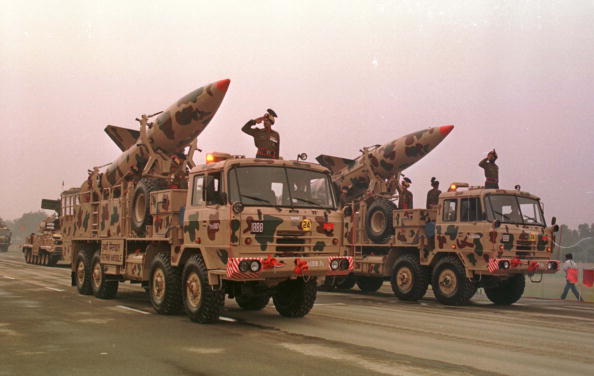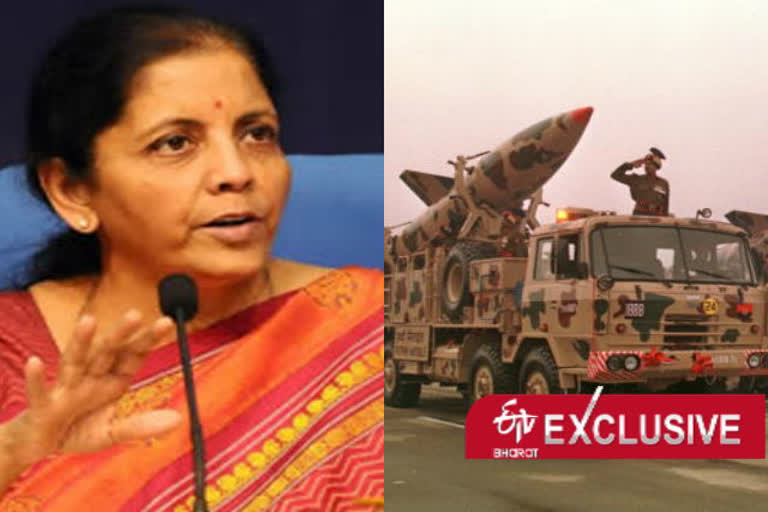ನವದೆಹಲಿ: ಪ್ರಧಾನಿ ನರೇಂದ್ರ ಮೋದಿ ನೇತೃತ್ವದ ಎರಡನೇ ಅವಧಿಯ ಕೇಂದ್ರ ಎನ್ಡಿಎ ಸರ್ಕಾರ ಇದೇ ಜುಲೈ 5 ರಂದು ಬಜೆಟ್ ಮಂಡಿಸಲಿದೆ. ವಿತ್ತ ಸಚಿವೆ ನಿರ್ಮಲಾ ಸೀತಾರಾಮನ್ ಬಜೆಟ್ ಮಂಡನೆ ಮಾಡಲಿದ್ದಾರೆ. ಈ ಹಿಂದೆ ನಿರ್ಮಲಾ ಸೀತಾರಾಮನ್ ಕೇಂದ್ರ ರಕ್ಷಣಾ ಸಚಿವ ಆಗಿದ್ದ ಕಾರಣ, ಈ ಬಾರಿ ರಕ್ಷಣಾ ಕ್ಷೇತ್ರಕ್ಕೆ ಬಜೆಟ್ ನಲ್ಲಿ ಭಾರೀ ಕೊಡುಗೆ ನೀಡುವ ಸಾಧ್ಯತೆ ಇದೆ.
ಕೇಂದ್ರ ಎನ್ಡಿಎ ಸರ್ಕಾರ ತನ್ನ ಮೊದಲ ಅವಧಿಯ ಮಧ್ಯಂತರ ಬಜೆಟ್ ಮಂಡನೆ ವೇಳೆ ರಕ್ಷಣಾ ವಲಯಕ್ಕೆ 3 ಲಕ್ಷ ಕೋಟಿ ರೂ. ಮೀಸಲಿಟ್ಟಿತ್ತು. ಇದು ಕಳೆದ ವರ್ಷದ ಪರಿಷ್ಕೃತ ಅಂದಾಜಿಗಿಂತ ಶೇ. 6.96 ಹೆಚ್ಚಾಗಿತ್ತು. ಹಾಗಾಗಿ ಈ ಬಾರಿಯ ಬಜೆಟ್ ಮಂಡಿಸುವಾಗ ವಿತ್ತ ಸಚಿವರು ಭಾರತ ತನ್ನ ಜಿಡಿಪಿಯ ಶೇ. 1.5 ಕ್ಕಿಂತ ಕಡಿಮೆ ಹಣವನ್ನು ರಕ್ಷಣೆಗೆ ಖರ್ಚು ಮಾಡುತ್ತದೆ ಎಂಬುದನ್ನು ನೆನಪಿಟ್ಟುಕೊಳ್ಳುವುದು ಸೂಕ್ತ. ಚೀನಾ ಹಾಗೂ ಪಾಕಿಸ್ತಾನ ಕ್ರಮವಾಗಿ ತಮ್ಮ ಜಿಡಿಪಿಯ ಶೇ. 2.5 ಹಾಗೂ ಶೇ. 3.5 ರನ್ನು ರಕ್ಷಣೆಗೆ ಖರ್ಚು ಮಾಡುತ್ತಿದ್ದು, ಭಾರತ ಇವುಗಳಿಗಿಂತ ಕಡಿಮೆ ಖರ್ಚು ಮಾಡಲಿದೆ.ಹೆಚ್ಚುತ್ತಿರುವ ಹಣದುಬ್ಬರ ,ವಿನಿಮಯ ದರ ಏರಿಳಿತ, ಪ್ರಸ್ತುತ ಭಾರತದ ಆರ್ಥಿಕತೆ ಹಿನ್ನಡೆ ಸಾಧಿಸಿರುವುದರ ಪರಿಣಾಮ ಬಜೆಟ್ ನಲ್ಲಿ ಶಸ್ತ್ರಾಸ್ತ್ರಗಳ ಖರೀದಿ ಮತ್ತು ಇತರ ಮಿಲಿಟರಿ ಉಪಕರಣಗಳಿಗಾಗಿ ಖರ್ಚು ಮಾಡಬೇಕಾದ ಮೊತ್ತವು ಅಗತ್ಯಕ್ಕಿಂತ ಕಡಿಮೆ ಇರುತ್ತದೆ ಎಂದು ಅಂದಾಜಿಸಲಾಗಿದೆ. ಅಲ್ಲದೇ ಈ ಹಿಂದಿನ ಬಜೆಟ್ ನಲ್ಲಿ ಘೋಷಿಸಲಾದ ಯೋಜನೆಗಳು ಕೂಡ ಈ ಬಾರಿ ಬಜೆಟ್ ಗಾತ್ರ ಕುಗ್ಗಲು ಕಾರಣವಾಗಲಿವೆ ಎನ್ನಲಾಗಿದೆ. ಇದರ ಜೊತೆಗೆ, ಒನ್ ರ್ಯಾಂಕ್ ಒನ್ ಒನ್ ಪೆನ್ಷನ್ ಪಿಂಚಣಿ ಯೋಜನೆ ಅನುಷ್ಠಾನ, ಏಳನೇ ವೇತನ ಆಯೋಗದಡಿ ಹೆಚ್ಚಿಸಲಾದ ಸಂಬಳ, ಪಿಂಚಣಿ ಮತ್ತು ಬಾಕಿ ಪಾವತಿಗಳನ್ನು ಈ ಬಾರಿಯ ಬಜೆಟ್ನಲ್ಲಿ ಭರಿಸಬೇಕಾಗಿದೆ . ಹೀಗಾಗಿ ರಕ್ಷಣಾ ವೆಚ್ಚವನ್ನು ಹೆಚ್ಚಿಸುವುದು ಅಗತ್ಯವಿದೆ. ಅಲ್ಲದೆ ರಕ್ಷಣಾ ವೆಚ್ಚಗಳು ದಿನದಿಂದ ದಿನಕ್ಕೆ ಹೆಚ್ಚಾಗುತ್ತಿದ್ದು, ಈ ಹಿನ್ನೆಲೆ ರಕ್ಷಣಾ ವಲಯಕ್ಕೆ ಹೆಚ್ಚಿನ ಆದ್ಯತೆ ನೀಡುವುದು ಅನಿವಾರ್ಯವಾಗಿದೆ .

ಇದಕ್ಕಾಗಿ ರಕ್ಷಣಾ ಸಂಸದೀಯ ಸ್ಥಾಯಿ ಸಮಿತಿ ಮಾಡಿರುವ ಶಿಫಾರಸುಗಳನ್ನು ಗಮನಿಸಬೇಕು. ರಕ್ಷಣಾ ವೆಚ್ಚವನ್ನು ಕ್ರಮೇಣ ಜಿಡಿಪಿಯ ಶೇ. 3 ಕ್ಕೆ ಹೆಚ್ಚಿಸಲು ಈ ಸಮಿತಿ ಶಿಫಾರಸು ಮಾಡಿದೆ. ಹಂಚಿಕೆಯ ಪ್ರಮಾಣ ಎಷ್ಟು ಮುಖ್ಯವೊ ವೆಚ್ಚಗಳ ಗುಣಮಟ್ಟವೂ ಮುಖ್ಯ ಅಷ್ಟೇ ಮುಖ್ಯ ಎಂಬುದನ್ನು ಮರೆಯುವಂತಿಲ್ಲ. ಭಾರತದ ರಕ್ಷಣಾ ಕ್ಷೇತ್ರಕ್ಕೆ ಸಂಬಂಧಿಸಿದಂತೆ ಆದಾಯ ವೆಚ್ಚಕ್ಕೆ ಬಂಡವಾಳ ವೆಚ್ಚದ 20:80 ರಷ್ಟು ಕಳಪೆ ಅನುಪಾತವನ್ನು ಹೊಂದಿದೆ. ಉದಾಹರಣೆಗೆ ಭಾರತದಲ್ಲಿ ಆದಾಯ ವೆಚ್ಚವನ್ನು ಸಂಬಳ, ಯುದ್ಧ ಸಾಮಗ್ರಿ, ಸಾರಿಗೆ, ಬಟ್ಟೆ ಮತ್ತು ನಿರ್ವಹಣೆ ಇತ್ಯಾದಿಗಳಿಗೆ ಖರ್ಚು ಮಾಡಲಾಗಿದ್ದರೆ, ಬಳಕೆಯಲ್ಲಿಲ್ಲದ ಶಸ್ತ್ರಾಸ್ತ್ರಗಳು ಮತ್ತು ಉಪಕರಣಗಳ ಬದಲೀಕರಣ, ಆಧುನೀಕರಣ ಮತ್ತು ಭೂಮಿ ಮತ್ತು ಕಟ್ಟಡಗಳ ಖರ್ಚಿನ ಮೇಲೆ ಬಂಡವಾಳ ವೆಚ್ಚವನ್ನು ಮಾಡಲಾಗುತ್ತಿದೆ. ಹೀಗಾಗಿ ಭಾರತದ ರಕ್ಷಣಾ ವೆಚ್ಚವು ಗುಣಾತ್ಮಕ ಬದಲಾವಣೆಗೆ ಸಾಕ್ಷಿಯಾಗಬೇಕಾದ ಅನಿವಾರ್ಯತೆ ಎದುರಾಗಿದೆ. ಮತ್ತು ಆದಾಯದ ಖರ್ಚಿಗೆ ಬಂಡವಾಳದ ಖರ್ಚಿನ ಅನುಪಾತವನ್ನು ಸುಧಾರಿಸುವತ್ತ ಗಮನಹರಿಸಲು ಪ್ರಯತ್ನಿಸುವ ಅವಶ್ಯಕತೆಯಿದೆ, ಜೊತೆಗೆ ನಮ್ಮ ಸೇನೆ ಕೇವಲ ಸಂಖ್ಯೆಗಳಲ್ಲಿ ಮಾತ್ರವಲ್ಲದೇ ಗುಣಮಟ್ಟದಲ್ಲಿ ಶ್ರೇಷ್ಠತೆ ಹೊಂದುವುದು ಅವಶ್ಯವಾಗಿದೆ. ಈ ಹಿನ್ನೆಲೆ ಈ ಬಾರಿಯ ಬಜೆಟ್ ನಲ್ಲಿ ಹಣಕಾಸಿನ ನಿರ್ಬಂಧ ಹಾಗೂ ರಕ್ಷಣಾ ಅಗತ್ಯತೆಗಳನ್ನು ಸಮತೋಲನಗೊಳಿಸುವ ಕಾರ್ಯಕ್ಷಮತೆ ಹೆಚ್ಚಿಸುವುದು ಸದ್ಯದ ಭಾರತದ ಆರ್ಥಿಕ ಪರಿಸ್ಥಿತಿಗೆ ಅನಿವಾರ್ಯವಾಗಿದೆ.
ರಕ್ಷಣಾ ಬಜೆಟ್ ಹಂಚಿಕೆಗಳನ್ನು ಹಂತಹಂತವಾಗಿ ಹೆಚ್ಚಿಸುವಾಗ ಮತ್ತು ಖರ್ಚಿನ ಗುಣಮಟ್ಟವನ್ನು ಕಾಯ್ದುಕೊಳ್ಳುವ ಪ್ರಯತ್ನಗಳನ್ನು ಮಾಡುತ್ತಿರುವಾಗ, ದೇಶಾದ್ಯಂತ ಸೇನಾ ಘಟಕಗಳ ವ್ಯಾಪ್ತಿಗೊಳಪಟ್ಟ ಭೂಮಿ ಮತ್ತು ಕಟ್ಟಡಗಳಂತಹ ಸಂಪನ್ಮೂಲಗಳನ್ನು ಸೂಕ್ತವಾಗಿ ಬಳಸುವುದರ ಮೇಲೆ ಒತ್ತು ನೀಡುವ ಮೂಲಕ ಹಣಕಾಸಿನ ಬಾಧ್ಯತೆಗಳನ್ನು ಪೂರೈಸಲು ಹಾಗೂ ಸರಿದೂಗಿಸಲು ಸಾಧ್ಯವಿದೆ. ಹೀಗಾಗಿ ಭಾರತ ತನ್ನ ರಕ್ಷಣಾ ವಲಯದ ಖರ್ಚಿನ ಪ್ರಮಾಣ ಮತ್ತು ಗುಣಮಟ್ಟದಲ್ಲಿ ರಾಜಿ ಮಾಡಿಕೊಳ್ಳದಿದ್ದಾಗ ಮಾತ್ರ ಈ ನಿಟ್ಟಿನಲ್ಲಿನ ಪ್ರಯತ್ನಗಳು ಕೇಂದ್ರ ಸರ್ಕಾರದ ಮೇಲಿನ ಆರ್ಥಿಕತೆಯ ಒತ್ತಡವನ್ನು ಕಡಿಮೆ ಮಾಡಲು ಬಹಳ ಸಹಕಾರಿಯಾಗಲಿವೆ.
ಡಾ. ಮಹೇಂದ್ರ ಬಾಬು ಕೌರವ, ಸಹಾಯಕ ಪ್ರಾಧ್ಯಾಪಕರು, ಗರ್ವಾಲ್ ಕೇಂದ್ರ ವಿವಿ, ಉತ್ತರಾಖಂಡ್



